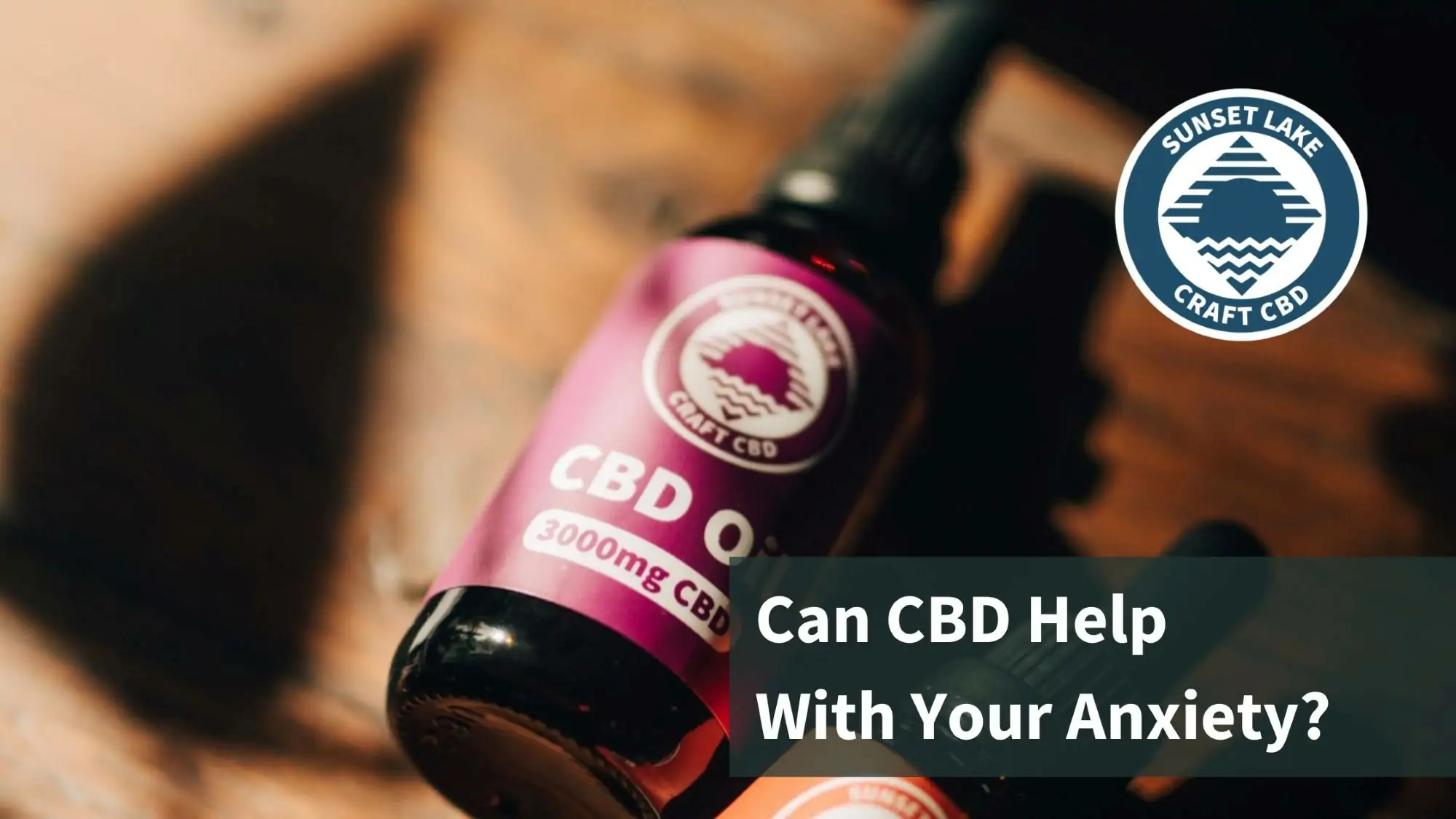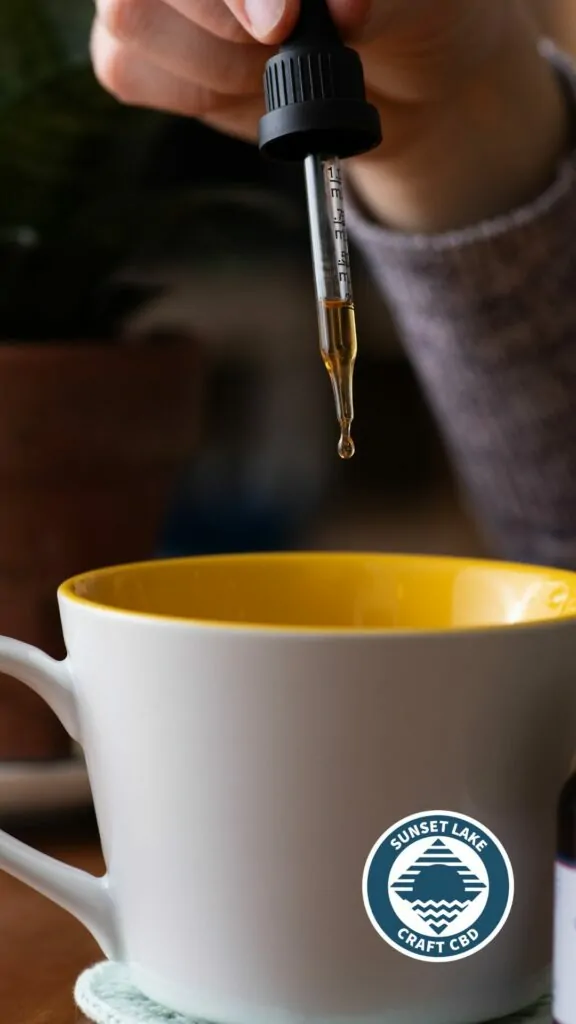No products in the cart.
Can CBD Help With Anxiety?

In the few years since CBD has become mainstream, you may have heard or read some anecdotes about CBD’s ability to cure just about any ailment, including anxiety. Surely a silver bullet for one of the most common, yet complex mental disorders is too good to be true right? There is plenty of anecdotal evidence that suggests CBD may be helpful for mental health, but can CBD help with anxiety?
In this piece, we’re going to,
- Unpack what anxiety is
- Learn more about what CBD is and how to use it
- And, look at what recent research says about CBD’s ability to help with anxiety
What Is CBD?
CBD is short for cannabidiol and is one of the more than 100 naturally occurring cannabinoids produced by the hemp plant.
Unlike THC, the main cannabinoid present in marijuana, CBD is non-psychoactive and is thought to curb some of THC’s less desired side effects like paranoia, anxiety, and an elevated heart rate.
Does CBD Help With Anxiety?
While the U.S. Food and Drug Administration (FDA) has only approved CBD for use in Epidiolex, an anti-seizure medication, the results of a 2020 SingleCare poll suggest that nearly half (49%) of CBD users go “off-label” and use CBD for anxiety and stress.
While nearly half of respondents use CBD for anxiety, it’s still difficult to know if CBD is helping with their anxiety or just alleviating symptoms caused by anxiety.
What is Anxiety?
Anxiety is a normal part of life and can present itself as nervousness and panic or in physical manifestations like sweating and increased heart rate. Anxiety disorders are more uncommon and can inflict more severe and persistent symptoms.
Some of the most common anxiety disorders include:
- Generalized Anxiety Disorder (GAD)
- Social Anxiety Disorder
- Separation Anxiety Disorder
- Panic Disorder
- Specific Phobias
What Does Anxiety Do?
There are many ways that anxiety can manifest itself. Common symptoms include:
- Feelings of nervousness or restlessness
- An impending sense of danger or doom
- Higher heart rate
- Hyperventilation
- Excessive sweating
- Shaking or trembling
- Feeling fatigued or weak
- Trouble being present. Always thinking about something in the past or future
- Trouble sleeping
- Gastrointestinal problems
Current Studies into CBD and Anxiety
There are several recent and ongoing studies into CBD and how it may help users manage anxiety disorders.
- A 2011 study found that CBD may help reduce anxiety and discomfort in people diagnosed with social anxiety disorder.
- A 2015 review of nearly 50 independent studies suggests that CBD could help alleviate generalized anxiety disorder (GAD), panic disorder, social anxiety disorder, obsessive-compulsive disorder, and post-traumatic stress disorder.
- A small study carried out in 2019 found that taking CBD in addition to routine psychiatric care helped reduce PTSD symptoms in adults. CBD also appeared to reduce the frequency and severity of PTSD-related nightmares in the test group.
- Several additional studies have been carried out on CBD (and other cannabinoids) and its impact on sleep— something people with anxiety disorders can struggle with.
Can CBD Cause Anxiety?
Some believe that CBD, but more generally cannabis, causes anxiety. While the science is still out on CBD’s link to anxiety, most studies thus far have indicated that CBD helps alleviate symptoms of anxiety.
“Cannabis” is a much more broad term. Recreational THC cannabis (a.k.a. marijuana) falls under the cannabis umbrella and has been known to cause increased heart rates, paranoia, and anxiety.
It’s important to delineate CBD from THC (and other THC-analogous cannabinoids) when we talk about cannabis’s link to anxiety.
How To Use CBD
Disclaimer: This piece was written for purely informational purposes. The efficacy of CBD has not been confirmed by FDA-approved research. CBD is not intended to diagnose, treat, cure, or prevent any disease. CBD will not cure or prevent anxiety or anxiety disorders.
How Much CBD Should You Take?
There are a lot of factors that play into what your ideal CBD dosage will be. If you’re new to cannabis or CBD products, be sure to talk to your doctor or pharmacist about any potential prescription drug interference CBD may cause.
We here at Sunset Lake CBD always recommend starting with a lower dose and working your way up once you’re acclimated. Start with 25mg per night and stick with that amount for at least a week. If 25mg isn’t delivering the relaxation that you want, gradually increase your dosage over time until you find a level that works for you.
What Is the Best Way To Take CBD?
CBD can come in several forms. Below are several more common forms:
Oral liquids – CBD Oil Tinctures and Mouth Sprays.
Oral liquids are generally well-homogenized, meaning that your dosing will be consistent. Oral liquids and CBD oil can take approximately 15-45 minutes to set in.
Edible items – Infused foods and beverages.
Edibles will take the longest to kick in (1-2 hours,) but will last longer because of how your digestive system works. The dosing may not be as consistent as oral liquids but should be within a 10% margin of error.
Topicals – Targeted relief to sore areas, not to be ingested.
Unlike oral liquids and edible items, topicals will not bring you a general feeling of relaxation, rather they’re for targeted relief. For example, if your biggest hindrance to a restful evening is a sore knee, try rubbing it with a CBD topical.
Smokables – CBD Flower, pre-rolls, and kief
Because of how inhalation and CBD ingestion work, smokables will kick in the fastest. So if you’re looking for relief now, smokable CBD may be the way to go. That said, smokable CBD will also “wear off” the fastest because you will metabolize vaporized CBD faster than any other method.
How To Find CBD
Peace of mind isn’t something you’ll want to stake on a sketchy online retailer. There are so many companies operating in the CBD space that promise miracle cures for any and all kinds of ailments. How can you know that you’re buying from a trustworthy vendor?
There are a few things you’ll want to look out for.
Website Smell Test
Think of an eCommerce store as a salesperson. The first question you should ask yourself is: Can I trust them? For many of us, it’s a gut reaction.
Use those same instincts here. If the CBD vendor’s website doesn’t look trustworthy and is pestering you with endless popups, don’t bother. However, if you’ve found a site that you like and trust…
Find Their Certificates of Analysis
From our blog post: How to Read a Certificate of Analysis
A certificate of analysis, or COA for short, is a document from an accredited third-party lab that confirms that your hemp product meets advertised specifications. COAs tell you a few things, most importantly the concentrations and variety of cannabinoids present in your product.
Certificates of analysis are important and should be included with every CBD purchase because…
- They ensure that your product contains advertised levels of CBD.
- COAs should also list any other relevant cannabinoids in your product.
- This includes CBN, generally thought of as another cannabinoid that promotes relaxation and restfulness.
- They indicate whether or not the product in question is fhttps://sunsetlakecbd.com/what-is-cbn/ederally-legal hemp or a federally-prohibited cannabis product.
- Products with over 0.3% of delta-9 THC by dry weight are considered to be THC cannabis.
- Depending on how your product is advertised— full-spectrum, broad-spectrum, THC-free, etc.— the presence of additional cannabinoids may be of concern.
Curious to see Sunset Lake CBD’s certificates of analysis? You can see them here.
Customer Reviews
Before you press that “Buy Now” button, take a look at customer reviews, both on and off the website. It may turn out that previous buyers have extra insight into how best to use the product, some tips on dosing, or, in worst-case scenarios, you may find out that the product in question may not help with your situation at all.
FAQ About CBD and Anxiety
Is CBD Safe?
CBD is generally well-tolerated by most, but that doesn’t mean that you won’t experience any side effects. Some of the most commonly reported are:
- Change in appetite
- Diarrhea
- Nausea
- Dizziness
- Upset Stomach
- Weight change
It should be noted that the side effects listed above are from short-term use. Because of CBD’s novelty, we have yet to observe any long-term side effects.
Is CBD Going to Interact With Other Medications?
Ask your doctor, or better yet your pharmacist. CBD can interact with other prescriptions. Specifically, CBD can slow down your liver’s ability to break down certain medications.
How Can You Reduce Anxiety?
There are several approaches an individual can use to reduce anxiety. None will cure you of anxiety. That goes for CBD too— it’s not a treatment nor a cure for anxiety.
These approaches include:
- Therapy
- Breathing exercises
- Journaling
- Meditation
- Socializing
- Thought reframing
- Physical activity
If ever your anxiety becomes an obstacle in your personal, interpersonal, or professional life consider seeking help from a health care provider.
Last Word: Does CBD Help With Anxiety
Anxiety is the most common mental health disorder among Americans. If you’ve struggled with an anxiety disorder, you know how taxing excessive worry can be.
CBD is not and should not be considered a treatment for anxiety. At best, CBD can help you address some of the symptoms of anxiety and make it easier for you to relax in solitary and social settings.
If you choose to use CBD to address your anxiety symptoms, be sure to consult your primary care physician first as well as your pharmacist to make sure that it won’t negatively interact with any of your medications.
Sources
- Bergamaschi, M., Queiroz, R., Chagas, M. et al. Cannabidiol Reduces the Anxiety Induced by Simulated Public Speaking in Treatment-Naïve Social Phobia Patients. Neuropsychopharmacol 36, 1219–1226 (2011). https://doi.org/10.1038/npp.2011.6
- Crippa, José Alexandre S et al. “Neural basis of anxiolytic effects of cannabidiol (CBD) in generalized social anxiety disorder: a preliminary report.” Journal of psychopharmacology (Oxford, England) vol. 25,1 (2011): 121-30. doi:10.1177/0269881110379283
- Blessing, Esther M et al. “Cannabidiol as a Potential Treatment for Anxiety Disorders.” Neurotherapeutics: the journal of the American Society for Experimental NeuroTherapeutics vol. 12,4 (2015): 825-36. doi:10.1007/s13311-015-0387-1
- García-Gutiérrez, María S., Francisco Navarrete, Ani Gasparyan, Amaya Austrich-Olivares, Francisco Sala, and Jorge Manzanares. 2020. “Cannabidiol: A Potential New Alternative for the Treatment of Anxiety, Depression, and Psychotic Disorders” Biomolecules 10, no. 11: 1575. https://doi.org/10.3390/biom10111575
- Eske, Jamie. “How to Use CBD for Anxiety.” Medical and Health Information, Medical News Today, 4 Aug. 2020, https://www.medicalnewstoday.com/ articles/how-to-use-cbd-for-anxiety.
- “Facts & Statistics | Anxiety and Depression Association of America, ADAA.” Anxiety Disorders and Depression Research & Treatment | Anxiety and Depression Association of America, ADAA, https://adaa.org/understanding-anxiety/facts-statistics. Accessed 20 May 2022.

